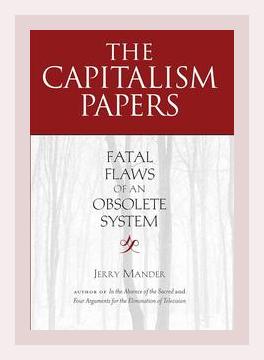Finance, Economics, Trading, InvestingWealth and Inequality
Summary of “The Capitalism Papers: Fatal Flaws of an Obsolete System” by Jerry Mander
Introduction
In “The Capitalism Papers: Fatal Flaws of an Obsolete System,” Jerry Mander offers a critical examination of capitalism, exploring its inherent flaws and arguing for its fundamental obsolescence. The book presents a compelling case against the capitalist system, suggesting that it is not only unsustainable but also detrimental to both human well-being and the environment. Mander’s critique is both provocative and insightful, making a strong argument for why a reevaluation of our economic systems is necessary. This summary will delve into the main themes of the book, key points of critique, and the implications of Mander’s arguments.
Key Themes and Concepts
1. Inherent Flaws of Capitalism
Mander begins by outlining the foundational flaws of capitalism. He argues that the system is driven by profit maximization, which leads to inequality, environmental degradation, and social instability. According to Mander, capitalism prioritizes short-term gains over long-term sustainability, resulting in a range of societal problems.
Example: Mander cites the financial crisis of 2008 as a direct result of capitalism’s focus on profit over stability. The crisis highlighted the system’s vulnerability and the extent to which it can fail when driven by unregulated greed.
Quote: “Capitalism’s primary goal is to generate profit, not to ensure social or environmental well-being.” This quote underscores Mander’s argument that capitalism is fundamentally misaligned with broader human values.
2. Environmental Destruction
A significant portion of the book is dedicated to the environmental impacts of capitalism. Mander argues that the system’s emphasis on continuous growth leads to the exploitation of natural resources and environmental degradation. He provides numerous examples of how capitalist practices have contributed to climate change and biodiversity loss.
Example: Mander discusses deforestation in the Amazon as a consequence of capitalist-driven agriculture and logging. The destruction of this vital ecosystem is portrayed as a direct result of prioritizing profit over ecological health.
Quote: “The pursuit of profit at the expense of the planet is not only unsustainable but also destructive.” This quote highlights the core issue of capitalism’s environmental impact, emphasizing the unsustainable nature of profit-driven practices.
3. Social Inequality
Mander also explores how capitalism exacerbates social inequality. He argues that the system inherently benefits the wealthy while marginalizing the poor. The wealth gap, he suggests, is a direct outcome of capitalism’s structural biases.
Example: The book provides a detailed analysis of income inequality trends in various capitalist countries, showing how the rich have grown richer while the poor have become poorer. Mander uses the example of rising executive salaries juxtaposed with stagnating wages for workers to illustrate this point.
Quote: “Capitalism creates a society where the rich get richer, and the poor are left behind.” This quote encapsulates Mander’s critique of how capitalism perpetuates and deepens social disparities.
Detailed Analysis
The Historical Context of Capitalism
Mander situates capitalism within a historical context, examining its development from early capitalist practices to the modern global economy. He argues that capitalism evolved to become more exploitative and less accountable over time. By tracing its historical trajectory, Mander aims to show that the problems of capitalism are not just contemporary but are deeply embedded in its structure.
Example: The book contrasts early forms of capitalism with the modern global economy, highlighting how the original principles of trade and commerce have transformed into a system focused on maximizing profit at all costs.
Alternatives to Capitalism
In the latter part of the book, Mander explores alternative economic systems that could replace capitalism. He advocates for systems that prioritize sustainability, equity, and community well-being over profit. Mander discusses various models, including eco-socialism and communal economies, as viable alternatives that address the shortcomings of capitalism.
Example: Mander examines the successes of cooperatives and community-based economies in various parts of the world, arguing that these models offer practical solutions to the problems identified with capitalism.
Quote: “The future lies in systems that value people and the planet over profit.” This quote reflects Mander’s vision for a post-capitalist world, where economic systems are designed with sustainability and human welfare in mind.
Conclusion
Jerry Mander’s “The Capitalism Papers: Fatal Flaws of an Obsolete System” presents a thorough and critical examination of capitalism, highlighting its detrimental effects on society and the environment. Through detailed analysis and compelling arguments, Mander makes a case for rethinking and ultimately replacing the capitalist system with alternatives that prioritize sustainability and equity. The book’s critical reception has been mixed, with some praising its bold critique while others question the feasibility of its proposed alternatives. Nonetheless, Mander’s work remains a significant contribution to discussions about economic systems and their impact on our world.
Overall, “The Capitalism Papers” serves as a thought-provoking examination of capitalism’s flaws and a call to action for exploring new economic paradigms that better serve humanity and the planet.
